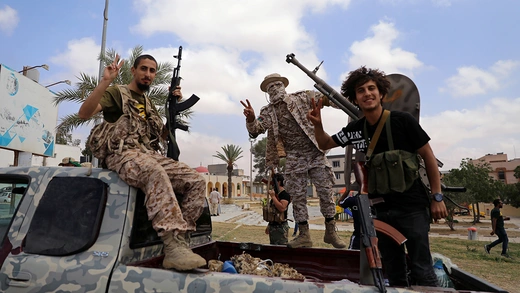By Kali Robinson
The conflict in oil-rich Libya has become a proxy war, fueled by rival foreign powers such as Russia and Turkey.
For months, UN-backed government forces have battled rebel commander Khalifa Haftar for control of Libya, with foreign powers increasingly wading into the fray. Here are the major players involved in the conflict:
The United Nations helped establish and formally endorsed Libya’s Government of National Accord (GNA) in 2015 to unify rival administrations that came out of the country’s 2014 elections. Based in the capital city of Tripoli, the GNA is led by Prime Minister Fayez al-Serraj and controls parts of the country’s west. The GNA’s armed forces comprise the remains of Libya’s official military as well as local militias, with more than thirty thousand fighters. It receives significant military aid from Turkey, Italy, and Qatar.
The Benghazi-based Libya National Army (LNA), a force of some twenty-five thousand fighters, is led by Khalifa Haftar, a former general who helped Muammar Qaddafi seize power in 1969 and allegedly assisted the CIA in the 1990s after breaking with Qaddafi. The LNA launched an assault on Tripoli in April 2019 and today controls large swaths of Libya’s east and south. Haftar claimed military rule over eastern parts of the country in April 2020, though it has not materialized, and his campaign to take western Libya has essentially collapsed amid opposition from GNA forces. The LNA’s backers include Egypt, France, the United Arab Emirates (UAE), and Russia. Notably, the UAE has provided the LNA with armed drones, while Russia has allegedly sent mercenaries. In January, the LNA shut down state oil production and exports, costing Libya over $4 billion.
House of Representatives
Opposing the western-based GNA is the House of Representatives (HoR), a legislature created in 2014 to govern until a constitution could be written. It refuses to recognize the GNA because it was installed by the international community and allegedly supports Islamists. The HoR relocated to the eastern city of Tobruk when Islamist militias overran Tripoli. House Speaker Aguilah Saleh heads the rival government and tapped former General Khalifa Haftar to lead the LNA in 2014, branding it the country’s official armed forces, though experts say the HoR has little control over Haftar.
Russia
Russia backs the HoR and LNA, seeking to secure oil and construction deals in Libya, which possesses the largest oil reserves and fourth-largest natural gas reserves on the continent. U.S. Africa Command said that as many as two thousand mercenaries belonging to the Russia-based Wagner Group were believed to have fought alongside the LNA. Moscow has denied reports that it condones Russians operating in Libya, but in May 2020, it reportedly sent more than a dozen fighter jets to support the private military contractors. Meanwhile, Moscow has blocked condemnation of the LNA at the United Nations and allowed the HoR to print a rival Libyan currency in Russia.
Turkey
Like Russia, Turkey’s involvement in Libya, where it supports the GNA, stems from a desire for a greater presence in the region. In particular, Ankara seeks to expand its control of energy reserves in the Eastern Mediterranean, and hopes to regain some construction contracts it lost after Qaddafi’s 2011 downfall. In January, it sent more than one hundred officers and two thousand Syrian militants—lured by promises of high wages and Turkish nationality—to fight alongside the GNA after months of providing weapons such as drones and air defense systems.
Militant Groups
The weakness of Libya’s state institutions has allowed local armed groups to emerge and flourish. In some areas, they provide security and law enforcement that the state cannot. However, powerful Islamist militant groups such as al-Qaeda, Ansar al-Sharia, and the self-proclaimed Islamic State also operate throughout the country.

Fighters loyal to Libya’s UN-backed government celebrate after regaining control over the city of Tarhuna. Ismail Zitouny/Reuters
The war has taken a heavy toll on Libyan civilians, who have been subjected to shelling near the front lines, injuries from explosive devices, and kidnappings for ransom. Near the western city of Tarhuna, the GNA discovered multiple mass graves after pushing the LNA out of the area. The UN Support Mission in Libya estimates that hundreds of civilians [PDF] have been killed nationwide since Haftar began his assault on Tripoli. Meanwhile, the United Nations High Commissioner for Refugees estimates that more than 200,000 people have been internally displaced and approximately 1.3 million people need humanitarian assistance.
United States
Though the United States helped lead the North Atlantic Treaty Organization (NATO) coalition that brought down Qaddafi in 2011, it no longer has a presence in Libya and has played a limited role in the current conflict. The United States officially supports the GNA but has not provided it with military support in its battle against the LNA. The primary U.S. concerns in the region are counterterrorism-related, and the United States has conducted joint air strikes with the GNA against Libya’s Islamist groups.
No comments:
Post a Comment